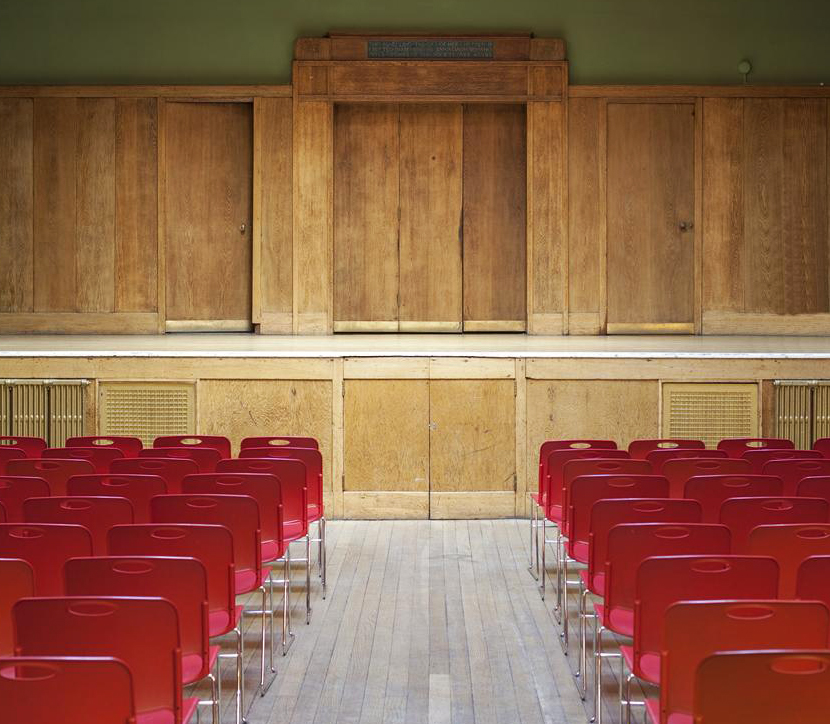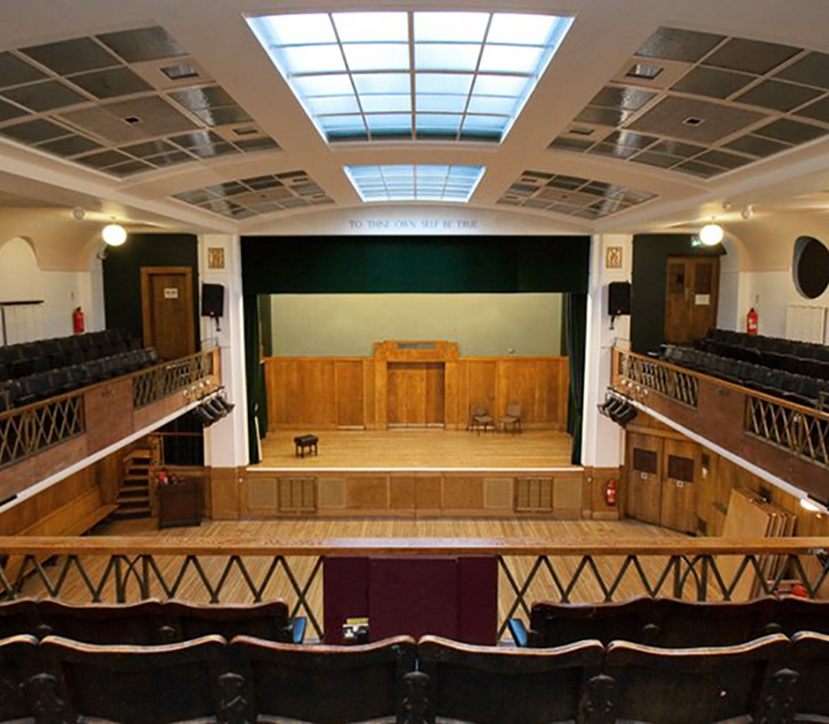A lecture1 delivered at
Conway Hall2, London
3rd December 1970
Ignorance is night. Night is ignorance. Aspiration is light. Light is aspiration. Today’s man has a name: ignorance. Tomorrow’s man has a new name: aspiration. The man of the day after tomorrow will have his real name: realisation.
Ignorance tells us: “No God! No God! There is no such thing as God.”
Aspiration tells us; “God is! God is! He is here. He is there. He is all-where.”
Realisation tells us: “God is everything, God is everywhere. Everything is God and everyone is God.”
Ignorance limits our earthbound consciousness. Aspiration heightens our Heavenward consciousness. Realisation liberates our soulful consciousness.
What is ignorance? What is aspiration? What is realisation? Ignorance is imperfection in the purest sense of the term. Aspiration is our inner cry for the highest illumination. Realisation is God’s Transcendental Smile on the seeker’s devoted head, aspiring heart and surrendered soul.
Now, what is consciousness? Consciousness is God’s open secret and man’s fulfilling life. Consciousness is the connecting link between aspiring humanity and illumining divinity. Consciousness is the connecting link between the glowing ascent of, our Mother Earth and the flowing descent of the fulfilling Heaven. Consciousness is the connecting link between earth’s transformation and Heaven’s absolute compassion. Consciousness is the illumining language that enables us to speak to God face to face. When consciousness is illumined, when consciousness is totally liberated and no longer earthbound, when consciousness becomes Infinity itself, then man has a free access to God. Then, at every moment he can listen to the dictates of his Inner Pilot.
In the life of aspiration, we come to realise eventually that God is everything and everyone. He is the Creator and He is the creation as well.
I am sure most of you have heard or read about a great spiritual figure named Vivekananda. Once he said, “Who else is God, if not I myself?” Now, if we think that he uttered these words on the strength of his own ego, we are mistaken. It was his total identification with the Highest that made it possible for him to speak this way. Similarly, the Son of God, the great Saviour Christ said, “I and my Father are one.” He said this on the strength of his conscious, absolute oneness, his inseparable oneness with his Inner Pilot. In days of yore our Vedic seers said, “Brahmasmi” — “I am the Brahman, the One Absolute.” They were able to say this on the strength of their own highest and deepest realisation. Each individual has not only the possibility but also the inner capacity to realise and grow into this truth. Possibility and potentiality we all have, but when we exercise our possibility and potentiality, then inevitability dawns and we reach our ultimate Goal.
Sat-chit-ananda: Sat means Existence, Chit means Consciousness, Ananda means Bliss or Delight. Existence, Consciousness and Bliss—this is the highest height, the triple consciousness. There, creation began its journey; there, the Truth is one. But when we come down one step, the song of multiplicity starts, because God wants to be fulfilled in millions and billions of forms. He wants to enjoy Himself divinely and supremely in infinite ways and in infinite forms and shapes. That is why creation started.
God has given to each individual limited freedom. This limited freedom we are misusing every day in our ordinary life. That is why it is almost impossible for us to come out of the meshes of ignorance. In the inner life, we have abundant freedom. But because we are not aware of this freedom, we are constantly caught in the in ire of ignorance.
One of our Upanishads, the Isha Upanishad, teaches us something significant. It says: Andham tamah pravishanti…. “Into tenebrous gloom and darkness one enters if one follows after ignorance; but into darker, more tenebrous gloom one enters if one follows knowledge alone.” Now, what is meant by knowledge in this case? This knowledge is the knowledge that we get from the physical mind, the reasoning mind, the doubtful mind, the sophisticated mind and the unillumined, intellectual mind.
The one who is in ignorance and darkness is simple and sincere to himself. He knows that he is ignorant of everything. This he says and feels in the inmost recesses of his heart. But those who are considered to be men of knowledge are constantly doubting God’s creation and doubting themselves. They feel they have come out of the animal kingdom and are a little bit superior to those who are still unlit, but they do not know what they are doing with their physical mind. This physical mind they are using to doubt, to break and to destroy — unfortunately, all unconsciously.
The Upanishad carries us farther. It says, Vidyam cavidyam ca yas tad vedobhyam saha. Avidyaya mrityum tirtva vidyayamritam asnute. “Ignorance and knowledge must be taken as one.” Avidyaya means ignorance and vidyam means knowledge. What we call ignorance eventually we will turn into human aspiration. Through human aspiration, we shall try to conquer death, and through divine knowledge, we shall enjoy Immortality.
Very often we meet people who have no faith in God, who are atheists. What do they do? They mock us. They think that spiritual people, sincere seekers, are all living in the land of the moon. They think that we do not want to face reality. I wish to tell you an incident. Two friends, one a stark atheist and the other a staunch theist, were talking together. The atheist said to his friend, “My friend, look what you have done. You have given up everything for God. You have given up your family. You have given up worldly pleasures, everything, all for God. You are really great.” That was pure sarcasm. But the immediate reply he got from his friend was, “My friend, you are greater than I. I have given up everything for God, but you are so great that you can live without Him! You are far greater than I.”
A problem arises for the householders, for anyone who wants to live a family life and, at the same time, realise God. They feel that it is next to impossible to realise God while living with their family while working and while using their earthly mind. I wish to say only that they should change their attitude toward life. They should try to see the divinity in humanity.
Suppose you think that your father is torturing you, that he has no wisdom. You don’t want to listen to him. All right, this is your outer father. But you should try to see inside him the living presence of God, your inner Father. The outer father may be totally ignorant, but the inner Father is all Knowledge, all Wisdom. Your outer mother — her outer existence, her physical mind — may be totally ignorant, but try to see the Goddess inside your mother. Try to feel the presence of God inside her. Try to see in your wife the divine beauty that inspires you toward perfection. Try to see inside your son or daughter a little divine child, God the Eternal Child. In this way, if you can see the divine in the human, then you don’t have to go to the Himalayan caves. You don’t have to leave your family and go to the top of Mount Everest to realise God.
Ignorance we all know. We are all swimming in the sea of ignorance. What we need is knowledge. Now, what is knowledge? If we go deep within, we come to realise that what we call knowledge, earthly knowledge, is our surrendering and dying strength for the new life and light. Every day, every moment, new life and new light are coming. Then we go a little farther and enter into the domain of wisdom. Wisdom is our illumining and fulfilling power, will-power, soul-power for the eternal Life and light.
There are two types of wisdom: human wisdom and divine wisdom. Love of God is the beginning of our human wisdom. Surrender to God’s Will, conscious surrender to God’s Will is the dawn of our divine wisdom. When the divine wisdom dawns soulfully, man’s forgotten essence is God and God’s fulfilling substance is man.
— End — 3
Endnotes:
1 ‘Ignorance-Night And Aspiration-Light’ was originally published in a personal account of Sri Chinmoy’s European lecture tours (1970-74) entitled Sri Chinmoy in Europe by Mahalakshmi, printed by Agni Press, New York, 1974. The lecture’s omission from My Rose Petals, Part 1 by Sri Chinmoy, in which all other lectures from the 1970 European Tour were collected, was cited by the author (Sri Chinmoy in Europe, p.21). It has subsequently never been published as part of Sri Chinmoy’s writings.
2 Conway Hall is owned and operated by Conway Hall Ethical Society, a membership organisation and educational charity with a history spanning two centuries. The name was chosen in honour of anti-slavery advocate and outspoken supporter of free thought Moncure Daniel Conway (1832-1907). The hall has become renowned as a hub for free speech and independent thought.
 |
 |
|
|
Conway Hall of yesterday...
|
and Conway Hall today.
|
3 After the lecture, Sri Chinmoy was asked several questions by the audience. The questions and answers were subsequently published in Sri Chinmoy’s book, Earth’s Cry Meets Heaven’s Smile, Part 2, printed by Agni Press in 1974.
